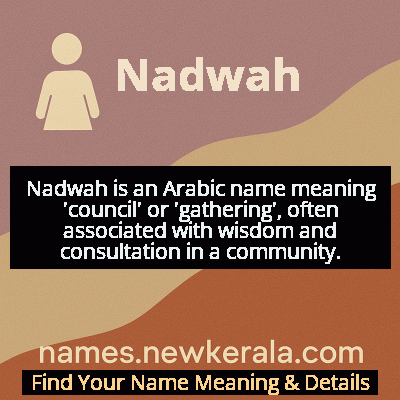Nadwah Name Meaning & Details
Origin, Popularity, Numerology Analysis & Name Meaning of Nadwah
Discover the origin, meaning, and cultural significance of the name NADWAH. Delve into its historical roots and explore the lasting impact it has had on communities and traditions.
Name
Nadwah
Gender
Female
Origin
Muslim
Lucky Number
6
Meaning of the Name - Nadwah
Nadwah is an Arabic name meaning 'council' or 'gathering', often associated with wisdom and consultation in a community.
Nadwah - Complete Numerology Analysis
Your Numerology Number
Based on Pythagorean Numerology System
Ruling Planet
Venus
Positive Nature
Harmonious, responsible, caring, and artistic.
Negative Traits
Overly idealistic, superficial, possessive, or jealous.
Lucky Colours
Pink, turquoise.
Lucky Days
Friday.
Lucky Stones
Diamond, turquoise.
Harmony Numbers
2, 3, 9.
Best Suited Professions
Artists, musicians, teachers, healthcare workers.
What People Like About You
Warmth, nurturing nature, artistic flair.
Famous People Named Nadwah
Nadwah bint al-Mundhir
Historical Figure
Daughter of the last Lakhmid king of al-Hirah, known for her intelligence and political influence in pre-Islamic Arabia
Nadwah al-Dawsari
Academic
Saudi researcher and writer specializing in Islamic studies and women's education in the Arab world
Nadwah Shams
Educator
Prominent educator and director of Islamic schools in Southeast Asia, known for curriculum development
Name Variations & International Equivalents
Click on blue names to explore their detailed meanings. Gray names with will be available soon.
Cultural & Historical Significance
With the advent of Islam, the concept of nadwah evolved but maintained its importance. The Islamic principle of shura (consultation) finds its practical expression in the nadwah tradition. The Prophet Muhammad himself emphasized the value of collective decision-making, and early Muslim communities continued the practice of holding councils to discuss community matters. Throughout Islamic history, various institutions bearing the name 'Nadwah' or 'Dar al-Nadwa' emerged as centers of learning and decision-making. The name thus represents a continuous thread connecting pre-Islamic Arab traditions with Islamic values of community, consultation, and collective wisdom.
Extended Personality Analysis
Individuals named Nadwah are typically characterized by their exceptional interpersonal skills and natural leadership qualities. They possess an innate ability to bring people together and facilitate meaningful dialogue, often serving as the glue that holds groups and communities together. Their diplomatic nature allows them to navigate complex social situations with grace and wisdom, making them sought-after advisors and mediators. Nadwahs tend to be excellent listeners who value diverse perspectives, and they have a remarkable capacity to find common ground among conflicting viewpoints.
These women often exhibit strong organizational abilities and strategic thinking, combined with deep empathy and emotional intelligence. They're typically patient, thoughtful decision-makers who consider multiple angles before reaching conclusions. Their strength lies not in dominating conversations but in orchestrating them—creating spaces where every voice can be heard and valued. This makes them particularly effective in educational, community leadership, and counseling roles. While they're natural consensus-builders, Nadwahs also possess the courage to stand by their principles when necessary. Their combination of warmth, wisdom, and diplomatic skill makes them respected figures in their personal and professional circles.
Modern Usage & Popularity
In contemporary naming practices, Nadwah maintains a distinctive presence as a meaningful choice that bridges traditional values with modern sensibilities. While not among the most common Muslim names, it enjoys consistent usage among families who value its rich historical connotations and meaningful essence. The name is particularly popular in Saudi Arabia, the Gulf states, and among Arab communities worldwide, where its connection to Islamic history and Arab heritage is deeply appreciated. In recent years, there's been a modest resurgence of interest in traditional names with profound meanings, which has benefited Nadwah's usage. Modern parents are increasingly drawn to names that carry cultural weight and positive attributes, making Nadwah an appealing choice for those wanting to instill values of community, wisdom, and leadership in their daughters. The name's relative rarity adds to its appeal for parents seeking something distinctive yet deeply rooted in Islamic tradition. Its usage crosses educational and socioeconomic boundaries, chosen by both traditional families and modern professionals who appreciate its meaningful heritage.
Symbolic & Spiritual Meanings
Symbolically, Nadwah represents the powerful concept of collective intelligence and community harmony. Beyond its literal meaning of 'council,' the name embodies the metaphorical idea of a gathering place for wisdom, much like an ancient tree under which elders would meet or a oasis where travelers would share knowledge. In Islamic symbolism, it connects to the Quranic concept of shura (consultation) and the Prophetic tradition of seeking collective counsel. The name symbolizes the bridge between individual insight and community wisdom, representing the ideal that the whole is greater than the sum of its parts.
Metaphorically, Nadwah can be seen as representing the convergence of diverse streams into a mighty river—each contribution adding to the collective strength. It symbolizes the Islamic values of unity (ummah), mutual consultation, and the importance of community in individual spiritual and social development. The name also carries connotations of safety and trust, as historical nadwahs were places where people could speak openly and seek genuine counsel. In a broader sense, Nadwah represents the human need for connection, dialogue, and shared understanding in an increasingly fragmented world, making it a name rich with positive symbolic resonance for modern times.

